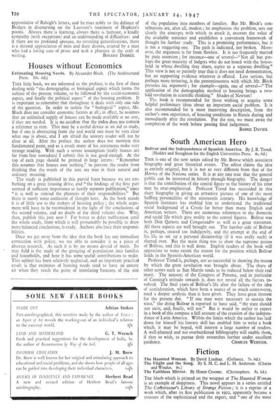Houses without Economics
THIS little book, we are informed in the preface, is the first of three dealing with " the demographic or biological aspect which forms the subject of the present volume, to be followed by the social-economic aspect, and finally the political aspect " of the housing problem. It is important to remember that throughout it deals with only one side of the question. In order to isolate ,the " biological " aspect, Mr. Block does not consider economic factors at all ; in effect, he assumes that an unlimited supply of houses can be made available at no cost, if they are needed. It is no accident that the index does not contain a reference to rent. This may be a useful device as an aid to study, but if one is abstracting from the real world one must be very clear what one is about, and I am afraid the unwary reader will not be clear at all. After the preface the author does not mention this fundamental point, and as a result many of his statements make very strange reading. With such a severe assumption (really houses are far from free nowadays) I submit this is not good enough. At the top of each page should be printed in large letters : " Remember this assumes that houses cost nothing," to prevent the reader from thinking that the words of the text are true in their natural and ordinary meaning.
The study is published in this partial form because we are em- barking on a great housing drive, and i`"the findings of the first part seemed of sufficient importance to justify separate publication," since " it is well to remind the planners of their responsibilities." But there is surely some confusion of thought here. As the book stands it is of little use to the makers of housing policy ; the whole argu ment will have to be reconsidered in the light of the conclusions of the second volume, and no doubt of the third volume also. Why, then, publish this part now ? Far better to delay publication until the whole study, from which it will presumably be possible to draw more balanced conclusions, is ready. Authors also have their responsi- bilities.
. Once we get away from the idea that the book has any immediate connection with policy, we are able to consider it as a piece of abstract research. As such it is by no means devoid of merit. Its true field is the study of the grouping of populations into families and households, and here it has some useful contributions to make. This subject has been relatively neglected, and an important practical result is that estimates of housing needs tend to have an uneasy air when they reach the point of translating forecasts of the size of the population into numbers of families. But Mr. Block's con- tributions are, after all, modest ; he emphasises the problem, sets out clearly the concepts with which to attack it, assesses the value of the available statistics and establishes a convenient framework of thought for further study. This is a promising performance, but it is not a staggering one. The path is indicated, not broken. More- over, the argument is far from flawless. It is too frequently marred by pure assertion ; for instance—one of several—" Not all but per- haps the great majority of lodgers who do not board with the house- hold in whose dwelling they share, aspire to a separate dwelling." This view is not so patently true that it does not need demonstration, but no supporting evidence whatever is offered. Less serious, but perhaps more irritating, is the pretentiousness with which Mr. Block presents his argument ; for example—again, one of several—" The application of the demographic method to housing brings a two- fold revolution in scientific thinking." Shades of Newton!
The book is recommended for those wishing to acquire some helpful preliminary ideas about an important social problem. It is also recommended for 'a most interesting description, from the author's own experience, of housing conditions in Russia during and immediately after the revolution. For the rest, we must await the completion of the work before passing final judgement.
BARRIE DAVIES.


































 Previous page
Previous page